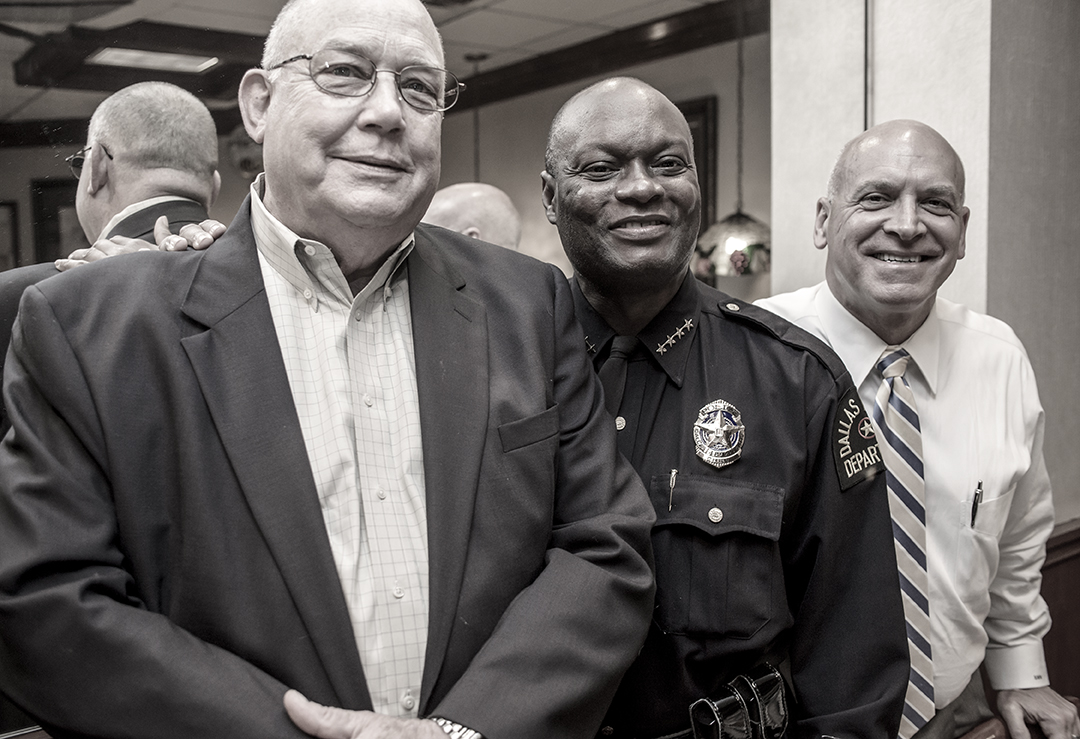
Bill Blaydes, Chief David Brown, Steve Wakefield in 2013. Photo by Danny Fulgencio for the Advocate.
David Brown, who left his post as Dallas police chief in 2016, resigned this week as Chicago’s top cop, effective March 16. He will return to his hometown to take a position as chief operating officer with the law firm Loncar Lyon Jenkins (as in Dallas County Judge Clay Jenkins).
Brown announced his resignation from Chicago police hours after Chicago Mayor Lori Lightfoot lost her re-election bid.
Brown, who served as Dallas police chief from 2010 to 2016, took over the country’s second-largest municipal police department in April 2020, overseeing Chicago PD at the height of the COVID-19 pandemic, rising violent crime rates and protests in the wake of the murder of George Floyd.
The former East Dallas resident turns 63 in October – the mandatory retirement age for Chicago police officers.
Brown said in a statement that he’s stepping down to allow the incoming mayor to “begin the process as soon as possible to hire the next superintendent.”
He joined the Dallas police force in 1983, following in the footsteps of his father and brother, both of whom were also police officers. In his retirement announcement he said he enlisted “because of the crack cocaine epidemic’s impact on my neighborhood in Oak Cliff. I wanted to be part of the solution.”
Over the course of his career, the South Oak Cliff High School alumnus held a variety of positions within the department, including patrol officer, detective and SWAT team member.
He earned his stripes as the commander of the northeast division, which covers neighborhoods in Lake Highlands, East Dallas, Vickery Meadow, Upper Greenville and Preston Hollow.
Many area oldtimers credit Brown and his so-called ‘Operation Kitchen Sink’ with helping to clean up problem areas back in the early 2000s. In 2004, he was promoted to assistant chief, and six years later, he was named chief of the department. (Advocate reporters in 2013 heard his war stories at a neighborhood breakfast, when homeowners gave Brown an award shaped as an actual kitchen sink).
Brown’s personal losses during his Dallas police era made him an especially sympathetic public figure. Just weeks after Brown became chief, Police shot and killed his 27-year-old son after he murdered two people, including an officer, during an apparent psychotic break.
Brown, whose former partner and brother were also killed years earlier, said he returned to work with increased devotion to his job and more empathy for victims and suspects alike.
“My sense of duty not only got me out of bed,” he recounted later, in his 2017 book, Called to Rise. “It also began my healing.”
He faced friction with police unions in early 2016 — some called for his resignation — after he implemented unprecedented scheduling changes as a response to rising crime rates, but everything changed that summer.
In July 2016, a lone gunman opened fire on police officers after a protest in downtown Dallas. Five officers were killed, and several others were injured. In the days that followed, Brown became the public face of the city’s response to the tragedy, delivering impassioned speeches and comforting the fallen officers’ families.
After he resigned from Dallas PD in October 2016, after 33 years of service, Brown continued to speak out, urge officers to be more proactive in building relationships with residents and encourage departments to diversify their ranks and hire more officers of color. He even did a stint as a commentator on ABC News.
Brown also has served as senior advisor for Pharos Capital Group Private Equity, Mark Cuban Enterprises/Dallas Mavericks Professional Basketball team and the Rainwater Foundation.
David Brown’s life and career has thus far been drama, filled with victories and tragedies. The same could be said for the life and times of the personal injury law firm Loncar Lyon Jenkins, which he will join in Dallas.
In 2020, Jenkins and Ted Lyon purchased the firm following a contentious, three-year battle over celebrity Texas lawyer Brian Loncar’s estate in probate court.
Loncar — known from TV as the “strong arm of the law” who sponsored local cycling teams and tipped big at restaurants (as I recall from college bartending days) — died in his car from a drug overdose while ostensibly attempting to manage his grief after his teenage daughter, less than two weeks earlier, committed suicide.
According to a Morning News story Brian Loncar’s first- and second-named executors, including his father, declined to take the firm so it went to third choice, Jenkins, a close friend of the family. Loncar’s daughters and heirs Abby and Hailey later approached Jenkins to purchase the firm, reported the Beaumont Enterprise upon completion of the sale.





